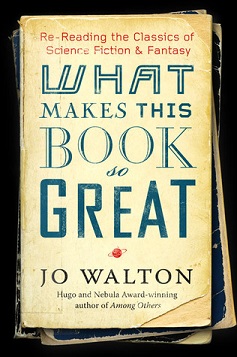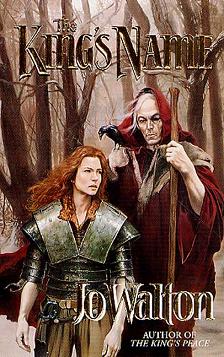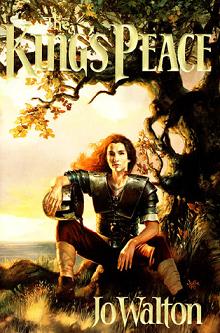We should take the pledge to make a considerable and consistent effort to mention women’s work which, consciously or unconsciously, has been suppressed. Call it the Russ Pledge.
Jo Walton joined rec.arts.sf.written at around the same time as I did, back in 1994. This was before the web had really started going and Usenet was the hot new social medium, though we didn’t call it that then. Text based, it played to Jo’s strengths and she quickly became one of the top posters on rasfw — not a small achievement in that pressure cooker full of highly articulate, intelligent people, not to mention huge egos. The same insights and knowledge she now brings to her posts at the Tor blog now, she already showed back then. Her presence was one of the things that made rec.arts.sf.written the best place to talk about science fiction online ever. Jo wasn’t just another sf fan; like so many of us she was also attempting to break into writing. Having written a couple of short stories, it was a connection made through rec.arts.sf.written, with Tor editor Patrick Nielsen Hayden, that got her first novel published in 2000. Since then she has written eight more.
Her best novel so far is her latest and also her most personal: Amongst Others, published in February, is both a fantasy story and the coming age story of a science fiction fan where you don’t need much imagination to see much of Jo herself in her protagonist. To quote from my review:
But that isn’t what her life revolves around. For the most part this is the diary of a fifteen year old girl interested in science fiction and fantasy, a fan of Ursula LeGuin, Robert A. Heinlein, Roger Zelazny and James Tiptree Jr., but not Philip K. Dick or Stephen Donaldson. Her diary entries are about what’s going on with school, reading books and buying books, getting involved with her father’s side of the family and worries about the family she left behind in Wales, Grampaw and Auntie Teg and finding other people who like science fiction, including her father. These parts are where the Jo-ness shines through, but also the most universal parts of the story. There’s one heartbreaking little scene when she and her father are staying in a hotel somewhere and he gets drunk in the bar below and comes into their room and tries to climb into her bed and kiss her and she’s trying to reason it out through what she learned from Heinlein that incest is not a sin if no children are concieved but she has no contraceptives and it doesn’t feel right but it’s nice to be wanted and…
Before that, there was the Small Change series of alternate history novels, featuring the familiar concept of a Britain that has made peace with Nazi Germany, but which Jo had managed to give a new twist. Again quoting from my own review of the first book, Farthing:
Farthing grabbed me by the throat from the first page and didn’t let go; one of the very few books to have ever done that. As with any other alternate WWII story, part of that is due to what you know is going on in the background that the characters themselves do not know yet or only suspect. Every such Hitler wins story depends on the tension between what the reader knows happened historically and what the characters in the story know or do not know: sometimes this is done explicit, as in Fatherland, where the whole point of the book is to get the protagonist up to speed on what we as readers already know. In Farthing’s case though things are kept implicit. What Walton does is let the essential horror of the setting speak for itself, keeping the swastikas and Gestapo goons offstage. What she does in fact is showing that England did not need these props to become a fascist state.
England after all was a deeply racist country before the war, where anti-semitism was deeply ingrained, as anybody who has read classic cozies knows — even an enlightened writer like Dorothy L. Sayers could talk about a “typical Jew” with all the stereotypes that entails. What Walton does in Farthing is take the casual racism and snobbery of a Josephine Tey and makes it all slightly more explicit and horrid, but still recognisable English. No Kristallnacht, but it is quite casually established Jews cannot buy land.
I’ve not read all of her books, but every book I’ve read of hers was no less than excellent. What’s more, she’s not content to keep repeating her earlier successes. Her first three novels were Arthurian sagas set in a fantasy Britain: this was follewed by her attempt at an Anthony Trollope novel, but with dragons. Then there were the three Small Change alternate history novels, a return to fantasy with Lifelode and finally Among Others. Despite their differences these novels do have something in common, in that each in their own way treats with the Matter of Britain, what it means to be British to the core, in the very old fashioned last Roman in England way that Jo Walton has.
Do yourself a favour and read:
- The King’s Peace (2000)
- The King’s Name (2001)
- The Prize in the Game (2002)
- Tooth and Claw (2003)
- Farthing (2006)
- Ha’penny (2007)
- Half a Crown (2008)
- Lifelode (2009)
- Among Others (2011)


